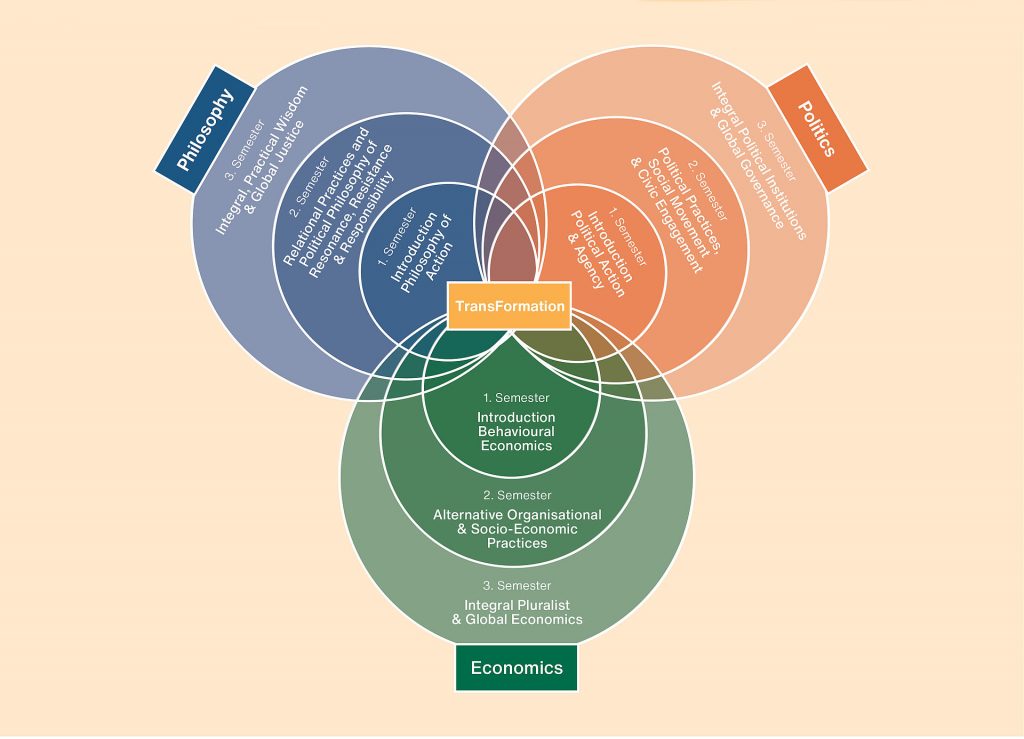The Master in Social TransFormation – Politics, Philosophy & Economics is close to the pulse of our time, its challenges and the desire for a more sustainable future.
Aspirations and goals | Social TransFormation – PPE
Our current economic and socio-political landscape is characterized by increasingly complex globalization, numerous trouble spots, unethical practices in business and politics and a lack of sustainability in many areas. Democracies are being deliberately weakened, populist tendencies are growing and the call for a post-national mindset is getting louder. In order to understand and deal with this complex situation, a holistic and interdisciplinary solution perspective is required – and this is exactly what the Master in Social TransFormation – Politics, Philosophy & Economics teaches.
The aim is to enable students and graduates of this degree program to take responsibility in this complex world and to train them to become critically thinking and reflective actors in current affairs.
This degree program starts in October (fall semester).
Everything at a glance – Social TransFormation – PPE
Application deadline
EU: Sept. 1, non-EU: July 15 or later, depending on the visa process of the home country
Start of studies
october
Duration of study
4 semester
Tuition fee
EU: 790 € / month
Non-EU: 1090 € / month
ECTS points
120
Teaching language
English
Lectures
Thursday evening, Friday to Saturday lunchtime (and block seminars)
Contents of the Master in Social TransFormation – PPE
Students of the “Master in Social TransFormation – Politics, Philosophy & Economics” deal with topics such as the common good, social movements, migration, war and peace, power and conflict, multiple crises, sustainability or alternative ways of doing business and living. This includes being able to examine complex, even transnational contexts and problems.
At the same time, students should be qualified to gain well-founded knowledge and surprising insights as well as to develop creative solutions, to act in a sustainable and ethically reflected manner, to shape relationships, to take on leadership tasks and to actively assume roles and comprehensive responsibility in teams.

The structure
The first semester initially teaches the basics of the three subject areas at the micro level:
- Philosophy: Introduction Philosophy of Action
- Politics: Introduction Political Action & Agency
- Economics: Introduction Behavioral Economics
After this advanced introductory phase, the following topics follow at a meso level in the second semester:
- Philosophy: Relational Practices and Political Philosophy of Resonance, Resistance & Responsibility
- Politics: Political Practices, Social Movement & Civic Engagement
- Economics: Alternative Organizational & Socio-Economic Practices
This is followed in the third semester at the macro or mundo level:
- Philosophy: Integral Practical Wisdom & Global Justice
- Politics: Integral Political Institutions & Global Governance
- Economics: Integral Pluralist, Global Economics
Modules: Master in Social TransFormation – PPE
The main (compulsory) modules are like a backbone that is supplemented by two of the following holistic specializations , some of which are linked to the Master’s degree course as elective modules:
- Brands & Stories
- Diversity Leadership & Feminism
- Digital Media
- Sustainability & Urban Development
- Globalization, Governance & Trade
It is aimed at anyone who wants to help shape the world we live in and become a game changer . Accordingly, the program serves both to develop the ability to think beyond current boundaries and to engage – theoretically informed and philosophically reflected – with developments in the real political and economic worlds .
Master in Social TransFormation – PPE Structure first year
- 5 ECTS – Specialization I
- 5 ECTS – Specialization II
- 5 ECTS – Introduction Political Action, Agency & Affect
- 5 ECTS – Introduction Philosophy of Action
- 5 ECTS – Introduction Behavioral Economics
- 5 ECTS – Leading Yourself – Personal Capabilities
- 5 ECTS – Specialization I
- 5 ECTS – Specialization II
- 5 ECTS – Political Practices, Social Movement & Civic Engagement
- 5 ECTS – Relational Practices and Political Philosophy of Resonance, Resistance & Responsibility
- 5 ECTS – Alternative Organizational & Socio-Economic Practices
- 5 ECTS – Leading Others – Power, Conflict and Negotiation
Master in Social TransFormation – PPE Development second year
- 5 ECTS – Specialization I
- 5 ECTS – Specialization II
- 5 ECTS – Integral Political Institutions & Global Governance
- 5 ECTS – Integral, Practical Wisdom & Global Justice
- 5 ECTS – Integral Pluralist, Global Economics
- 5 ECTS – Leading Change – Creativity, Improvisation & Play
- 5 ECTS – Special Issue (Transformative Research Project) or Internship (Transformative Practice Project)
- 2 ECTS – Research Colloquium
- 20 ECTS – Master’s thesis
- 5 ECTS – Personal Transformation – Lifelong Learning
